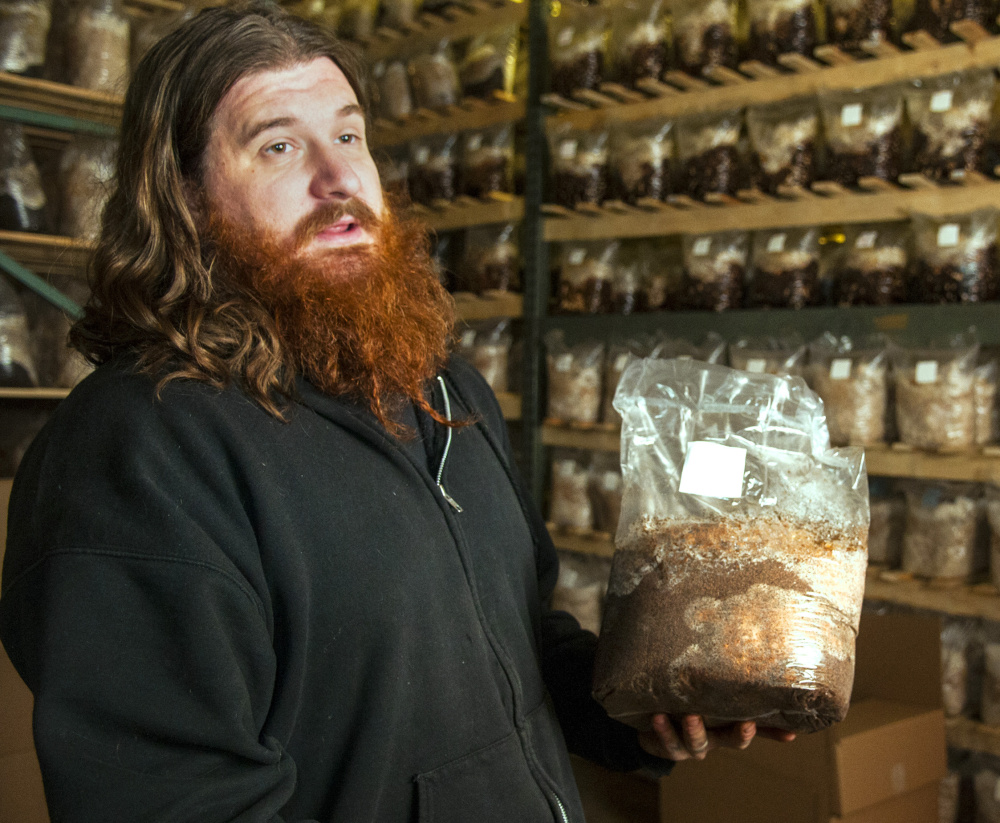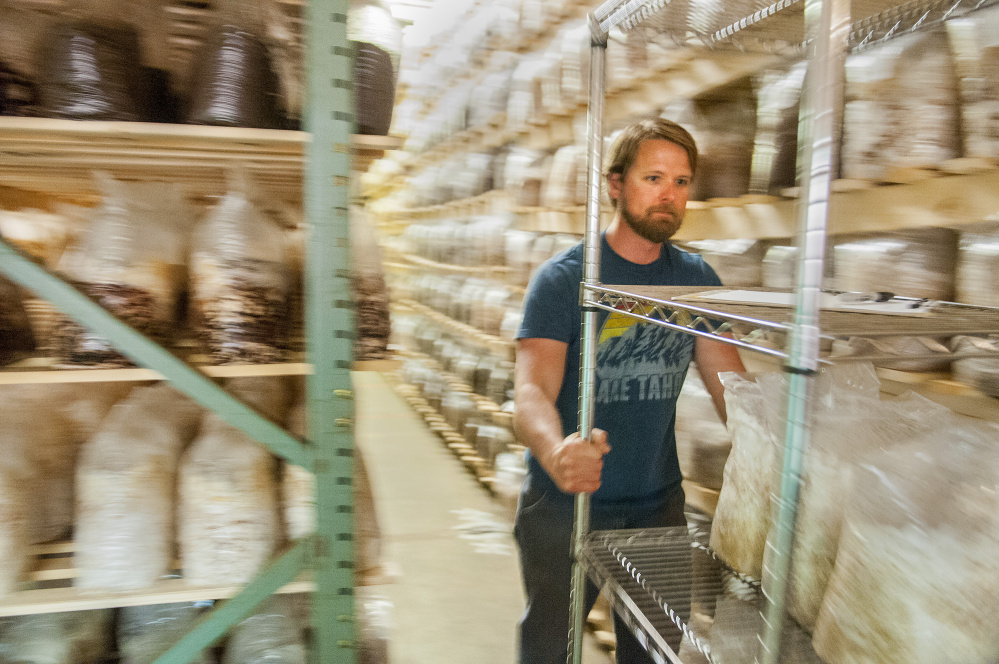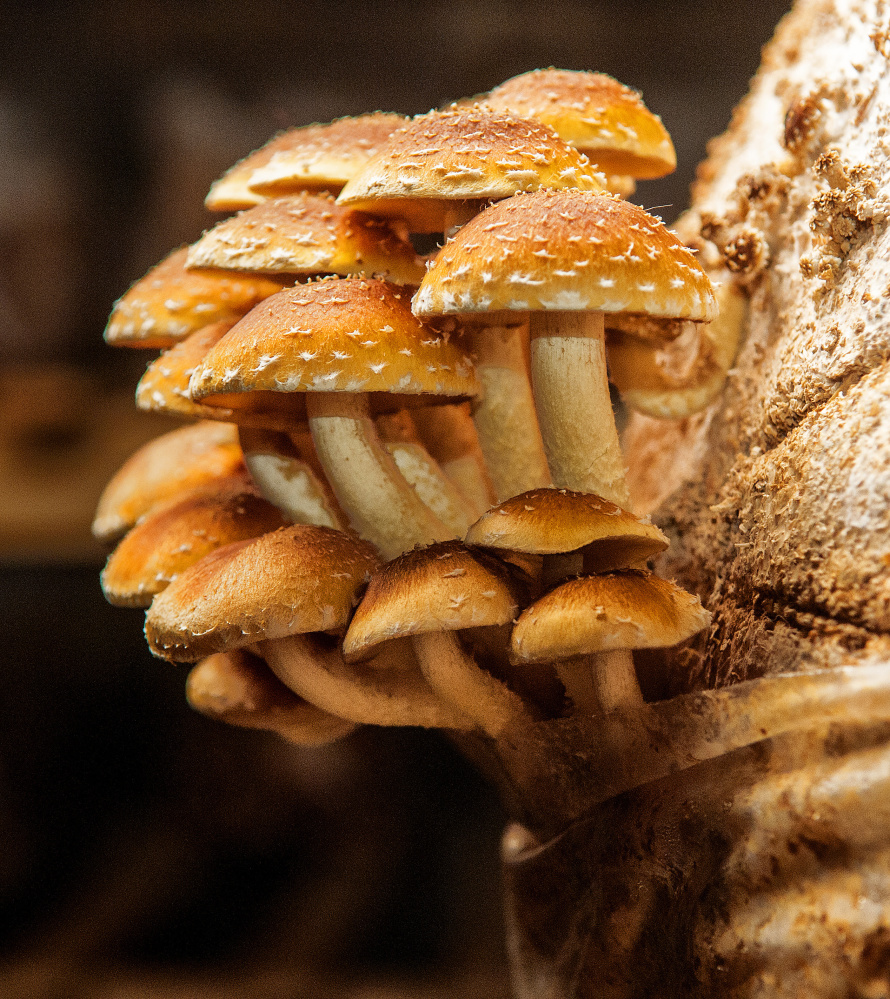GARDINER — At some point in building Maine Cap N’ Stem, it became clear the original plan wasn’t going to work.
Three partners – Mark Robinson, Erik Lomen and Christopher Campbell – had come together to grow organic gourmet mushrooms, but it was just too much.
“Once you get going,” Robinson said, “you can’t stop. If we don’t produce right now, we are screwed in two months.”
Growing mushrooms, it turns out, is about a 20-step process that generally can be split into two parts. The first part is developing the growing material and inoculating it with the kind of mushrooms you want to grow. The second part is the fruiting stage when mushrooms start to grow, and all the steps needed to get them to market. Completing both halves of the equation leads to 90-hour workweeks and few breaks.
They gutted their business plan and built a new one from the ground up as a wholesaler of mushroom blocks to growers.
Maine Cap N’ Stem focuses on wood-loving mushrooms – shiitake, chestnut, oyster and lion’s mane – for which it makes a red oak sawdust-based sterile substrate into which they introduce spawn. The mixture is sealed into specially made plastic bags and left to incubate in a temperature-controlled environment.
The process is about understanding how mushrooms grow and controlling it so the packs don’t fruit before they should.
That decision triggered others, including relocating outside the Portland region, where high demand for space generally means high rent.
Their 3,000-square-foot facility in Westbrook was suitable when they were growing mushrooms for the retail market, but for a wholesale facility where proximity to customers isn’t a priority, it wasn’t going to work.
When they looked for other commercial spaces a little more than a year ago, Gardiner popped up on the radar, with a former mill space off Brunswick Avenue.
“This move is probably the smartest business move that we have made,” Robinson said, standing in the company’s incubation room Friday as workers filled customer orders.
For Gardiner’s part, finding Maine Cap N’ Stem was a happy accident.
Patrick Wright, executive director of Gardiner Main Street and economic development coordinator for the city of Gardiner, had been looking at a building in downtown Gardiner and mentioned they were looking for warehouse space in central Maine.
“We weren’t explicitly seeking them out,” Wright said. “They recognized quickly we are a community and area seeking that kind of economic development.”
In an era of increasing consolidation in the food sector, Wright said the local foods movement, which is one of Gardiner’s economic engines, is a bright spot where entrepreneurs can reclaim a part of food production.
“It takes a sharp entrepreneur to see it and to execute it,” he said. “What I also think is really smart – and I respect them for it – is they are letting their sales growth lead their investment growth.”
Their hands have been on everything they do.
“We do most of our own fabrication,” Robinson said. “The equipment that we use is not available on the open market.”
That means a lot of trial and error in building things such as the racks where the incubation occurs. Through a happy accident, they found the bags do better if they are spaced about a hand’s width apart. The incubating bags put off heat and the space allows the heat to disperse.
“Sometimes you are building something 17 times, but you get what you want,” he said.
At first, the partners thought they would build their market in the Northeast, reaching west to New York state and south to New Jersey, Lomen said.
Before long, word spread and Maine Cap N’ Stem started fielding orders from as far away as Montana, Colorado and Texas.
Right now, Lomen said, about half their product goes to New England and neighboring states, and half goes elsewhere. And that, he said, is good for the local economy because it draws in new money.
“You think of the local food movement as farm-to-table being within a 30-mile radius,” Wright said. “The local food movement in Montana is feeding the local food movement in Maine. That speaks not to a fad but a true economic trend.”
The company’s growth potential is strong.
The West Coast is filled with people, many of Asian descent, for whom mushrooms are a staple in their culinary tradition.
The East Coast is catching up and moving beyond the traditional white mushrooms that supermarkets regularly stock in the produce section.
The building they occupy has space for expansion, and that will accommodate their immediate plan to scale up the operation, adding more product and more workers, and helping farmers to reach their capacity
Jessica Lowell can be contacted at 621-5632 or at:
jlowell@centralmaine.com
Twitter: JLowellKJ
Send questions/comments to the editors.





Success. Please wait for the page to reload. If the page does not reload within 5 seconds, please refresh the page.
Enter your email and password to access comments.
Hi, to comment on stories you must . This profile is in addition to your subscription and website login.
Already have a commenting profile? .
Invalid username/password.
Please check your email to confirm and complete your registration.
Only subscribers are eligible to post comments. Please subscribe or login first for digital access. Here’s why.
Use the form below to reset your password. When you've submitted your account email, we will send an email with a reset code.